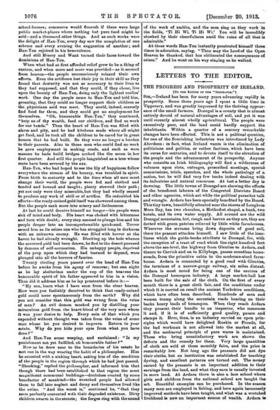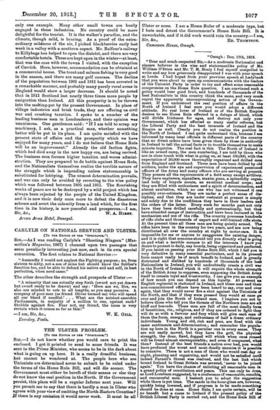LETTERS TO THE EDITOR.
THE PROGRESS AND PROSPERITY OF IRELAND.
[To TILE EDITOR Or THE "SPECTATOR.") SIR,—Ireland has been for many years advancing rapidly in prosperity. Some three years ago I spent a little time in Tipperary, and was greatly impressed by the thriving appear- ance of the small farmers. Donegal is a county that is almost entirely devoid of natural advantages of soil, and yet it was until recently almost wholly agricultural. The people were excessively poor, and the land could hardly support the inhabitants. Within a quarter of a century remarkable changes have been effected. This is not a political question, for one of the flourishing industries was introduced by Lady Aberdeen : in fact, what Ireland wants is the elimination of politicians and politics, or rather factious, which have been its curse for centuries, and to devote itself to the elevation of the people and the advancement of its prosperity. Anyone who consults an Irish bibliography will find a wilderness of volumes upon riots, outrages, proscribed meetings, special commissions, trials, speeches, and the whole pathology of a nation, but he will find very few books indeed dealing with its industries and natural resources. At last a better day is dawning. The little towns of Donegal are showing the effects of the beneficent labours of the Congested Districts Board and other agencies, which act while the political parasites talk and wrangle. Ardara has been specially benefited by the Board. This tiny town, beautifully situated near the shores of Loug bros More Bay, has two churches, a Methodist chapel, a bank, two hotels, and its own water supply. All around are the wild Donegal mountains, but, rough and barren as they are, they are dotted with green patches relieved by little white farmhouses. Wherever the streams bring down deposits of good soil, there the peasant attaches himself. I saw little of the lone- liness which the guide-books attribute to Donegal, for, with the exception of a tract of road which lies eight hundred feet above the sea-level, the highway from Glenties to Ardara, and thence to Carrick and on to Killybegs, passes countless home- steads, from the primitive cabin to the moderate-sized farm- house. Ardara is connected by a good road with Glenties, the terminus of a narrow-gauge railway, six miles distant. Ardara is most noted for being one of the centres of the Donegal homespun industry. A large market-hall has been built for the sale of the cloth. On the first of every month there is a great cloth fair, and the conditions under which it is carried on recall the ancient Yorkshire conditions, which base often been described. Hundreds of men and women tramp along the mountain roads bearing on their backs heavy loads of homespun. When they reach Ardara they present their bundle to an inspector, who measures it and, if it is of sufficiently good quality, passes and stamps it. Here, then, is an industry carried on upon prin- ciples which would have delighted Ruskin or Froude, for the bad workman is not allowed into the market at all, and the mediaeval principle of pure wares is maintained. Those who bring unsatisfactory work are shown the defects and the remedy for them. Very large quantities of cloth are sold at these monthly fairs, and the price is remarkably low. Not long ago the peasants did not dye their cloths, but an institution was established for teaching dyeing, and excellent patterns are turned out. The money earned by the peasants is an important addition to their earnings from the land, and what they earn is usually invested in more land. At Ardara there is also a lace school where girls and children from the national school are taught the art. Beautiful examples can be purchased. In the season many men are employed in fishing, and here again immensely improved methods have been taught, and what was a wretched livelihood is now an important source of wealth. Ardara is only one example. Many other small towns are busily engaged in these industries. No country could be more delightful for the tourist. It is the walker's paradise, and the climate, though mild, is bracing. As a proof of the extra- ordinary mildness of the air, I picked blackberries early last week in a valley with a southern aspect. Mr. Balfour's railway to Killybegs has helped to open the district, and there are very comfortable hotels. These are kept open in the winter—at least, that was the case with the towns I visited, with the exception of Carrick. Here, however, accommodation can be obtained at a commercial house. The trout and salmon fishing is very good in the season, and there are many golf courses. The decline of the population between 1901 and 1911 has been arrested in a remarkable manner, and probably many purely rural areas in England would show a larger decrease. It should be noted that in 1911 Scotland lost nearly three times more people by emigration than Ireland. All this prosperity is to be thrown into the melting-pot by the present Government. In place of village industries and brisk trade, they are offering us civil war and crushing taxation. I spoke to a number of the leading business men in Londonderry, and their opinion was unanimous. One gentleman said: "If I am told to scrap my machinery, I ask, as a practical man, whether something better will be put in its place. I am quite satisfied with the present state of affairs and the prosperity which we have enjoyed for many years, and I do not believe that Home Rule will be an improvement." Already the old faction fights, which had died away in the new happy era, are being revived. The business men foresee higher taxation and worse admini- stration. They are prepared to do battle against Home Rule, and the Nationalists themselves realize the terrible nature of the struggle which is impending unless statesmanship is substituted for lobbying. The utmost determination prevails, and war can only be avoided by reverting to the wise policy which was followed between 1895 and 1911. The flourishing works of peace are to be destroyed by a wild project which has always been rejected by the people of the United Kingdom, and it is now their duty once more to defeat the disastrous scheme and avert the calamity from a land which, for the first time in its history, is now peaceful and prosperous.—I am,











































 Previous page
Previous page